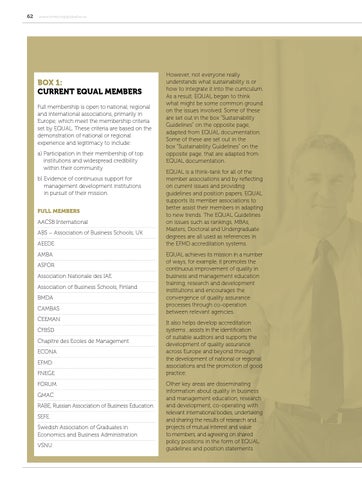62
www.efmd.org/globalfocus
BOX 1: CURRENT EQUAL MEMBERS Full membership is open to national, regional and international associations, primarily in Europe, which meet the membership criteria set by EQUAL. These criteria are based on the demonstration of national or regional experience and legitimacy to include: a) Participation in their membership of top institutions and widespread credibility within their community b) Evidence of continuous support for management development institutions in pursuit of their mission. FULL MEMBERS AACSB International ABS – Association of Business Schools, UK AEEDE AMBA ASFOR Association Nationale des IAE Association of Business Schools, Finland BMDA CAMBAS CEEMAN CFBSD Chapitre des Ecoles de Management ECONA EFMD FNEGE FORUM GMAC RABE, Russian Association of Business Education SEFE Swedish Association of Graduates in Economics and Business Administration VSNU
However, not everyone really understands what sustainability is or how to integrate it into the curriculum. As a result, EQUAL began to think what might be some common ground on the issues involved. Some of these are set out in the box “Sustainability Guidelines” on the opposite page, adapted from EQUAL documentation. Some of these are set out in the box “Sustainability Guidelines” on the opposite page, that are adapted from EQUAL documentation. EQUAL is a think-tank for all of the member associations and by reflecting on current issues and providing guidelines and position papers, EQUAL supports its member associations to better assist their members in adapting to new trends. The EQUAL Guidelines on issues such as rankings, MBAs, Masters, Doctoral and Undergraduate degrees are all used as references in the EFMD accreditation systems. EQUAL achieves its mission in a number of ways, for example, it promotes the continuous improvement of quality in business and management education training, research and development institutions and encourages the convergence of quality assurance processes through co-operation between relevant agencies. It also helps develop accreditation systems , assists in the identification of suitable auditors and supports the development of quality assurance across Europe and beyond through the development of national or regional associations and the promotion of good practice. Other key areas are disseminating information about quality in business and management education, research and development, co-operating with relevant international bodies, undertaking and sharing the results of research and projects of mutual interest and value to members, and agreeing on shared policy positions in the form of EQUAL guidelines and position statements.
